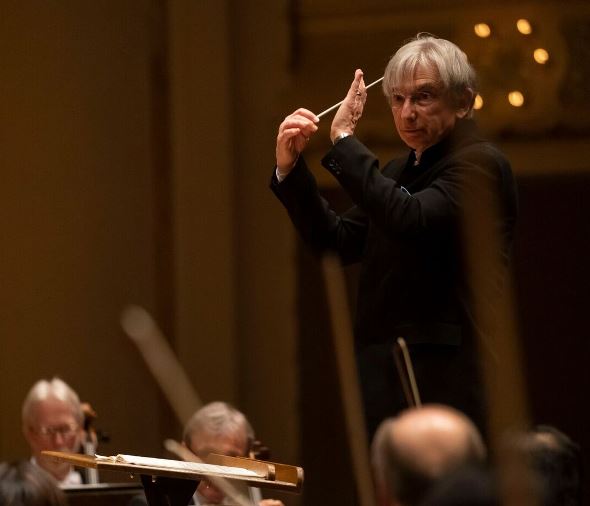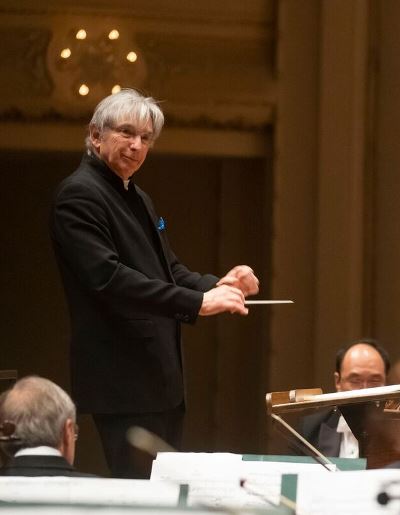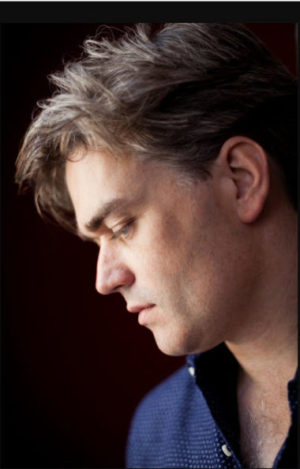Old friend MTT leads CSO in a Russian thrilla, and an impressive Brit makes podium debut

Review: Chicago Symphony Orchestra conducted by Michael Tilson Thomas (Dec. 13-15); conducted by Edward Gardner (Dec. 6-11).
By Lawrence B. Johnson
A banner in the rotunda of Symphony Center proclaims “HOLIDAY CHEER,” in just such sizable letters, over a promotional layout of seasonal concerts coming under the auspices of the Chicago Symphony Orchestra. But the last two weeks of CSO classical subscription concerts have exuded a festive air of their own. Performances first under British conductor Edward Gardner and then Michael Tilson Thomas stacked up like a great pile of wonderful gifts.
MTT, who will step down as music director of the San Francisco Symphony in 2020 after 25 seasons, was joined by the Scottish violinist Nicola Benedetti on Dec. 13 in a sensational all-Russian program repeated through Dec. 15.
The centerpiece, a freshly detailed and intensely dramatic turn through Tchaikovsky’s Symphony No. 6 in B minor (“Pathétique”), not only displayed Thomas’ imaginative immersion in the work but also attested to the close musical rapport between the conductor and this orchestra. In short, Thomas asked much and got everything.

Even at tempos that tended to briskness, Thomas summoned an expansive, clear and solidly constructed view of the “Pathétique.” What can sound repetitive in Tchaikovsky became, as in well-argued Schubert, endlessly varied in expression, rhythmic impetus and lyrical contour. The grandly framed first movement evolved from a gentle opening to a peak of titanic struggle – and that relieved by long, pathos-tinged phrasing of the famous principal theme. Principal clarinet Stephen Williamson’s eloquent playing earned the whooping ovation that acknowledged him at the end.
Thomas took an usually literal approach to the second movement’s marking of Allegro con grazia: It was fast, but the warmth of the CSO strings ensured that the “grazia” component never flagged. The ensuing march-scherzo, which invariably leaves an audience no physical choice but to burst into applause, lit up the house – and Thomas fully indulged his listeners before turning to the dark finale that gives the symphony its name. Here, the music’s somber cast was restrained and its human truth strengthened by that containment. Gorgeous playing by the CSO’s low brasses underpinned an all-around radiant sound.

In her CSO subscription debut, Benedetti offered an authoritative and absorbing account of Prokofiev’s Violin Concerto No. 2 in G minor. If this concerto has historically taken a back seat to Prokofiev’s Violin Concerto No. 1 in D major, that may be because the G minor is a more intimate and closely knit and indeed darker work than its older sibling. Perhaps the phrase dark brilliance applies to the G minor; in any case, Benedetti’s fierce performance threw off sparks of electric virtuosity – from her burnished tone to a technical facility that met the concerto’s formidable challenges with almost casual ease.
The lucid accompaniment Thomas elicited from the orchestra essentially picked up where the strings had left off in the program opener: Stravinsky’s Concerto in D for String Orchestra. As the “Pathetique” Symphony was composed in 1893, the Prokofiev concerto in 1935 and Stravinsky’s brief, crisp Neo-Classical concerto in 1946, the three works together offered an intriguing profile of Russian music going back across half a century.
Stravinsky’s 10-minute essay enjoyed the diamond-cut precision required to make it sparkle. Heady stuff from the CSO strings – and a reminder of the subtle, penetrating mastery of Michael Tilson Thomas, a conductor one can imagine soon spending more time with the Chicago Symphony.

If Thomas is an old friend of this orchestra, it surely made a new one the previous week with the debut concerts by British conductor Edward Gardner, who led a revelatory performance of Nielsen’s Symphony No. 4 (“The Inextinguishable”).
Gardner, 44, is principal conductor of the Norway’s Bergen Philharmonic. He has manifestly absorbed the language and the esprit of Nordic music, if one can judge by his animated, open-hearted account of the Nielsen Fourth. To be sure, the CSO followed his lead to the idiom of a work whose musical rhetoric too frequently comes across as if in awkward translation. This was a beautiful Fourth, as majestic as it was lyrical.
Lest I appear to pigeon-hole Gardner as a Nordic specialist – I’d be happy to have him back to pursue both Nielsen and Sibelius – I hasten to cite his fluent take on Richard Strauss’ “Four Last Songs” in support of an eloquent reading by soprano Erin Wall in that same concert. Never mind that the four songs aren’t really a single work; time and practice have indissolubly fused them as a collective masterpiece, vocally and orchestrally, of Strauss’ final years. And as surely as Wall conveyed the magnificence of the writing for voice, Gardner led the CSO in a luxurious turn through music that would be denigrated by the word accompaniment.
Tags: Edward Gardner, Erin Wall, Michael Tilson Thomas, Nicola Benedetti


No Comment »
1 Pingbacks »
[…] Recent appearances include a finely wrought Tchaikovsky “Pathétique” Symphony, in December 2018 (as pictured above in a Todd Rosenberg photo.) One of the world”s preeminent Mahler […]